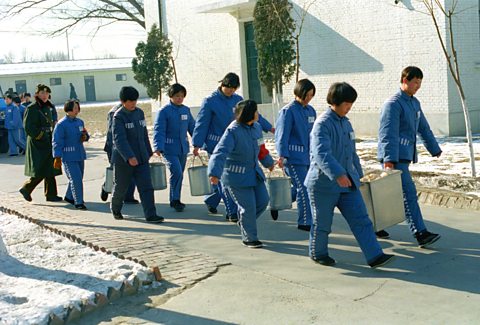What are human rights in China?
Although there is some evidence that the Chinese government has improved the rights of their people in a few areas, human rights groups such as Asia Watch and Amnesty International claim the rights of people in China are frequently abused.
Chinese criminal justice system
Unlike in the UK, the human rights of people accused of a crime in China are not protected by law.
Arrest and imprisonment

In China, people suspected of a crime are often arrested for long periods of time without appearing for trial. Those under arrest are often denied a lawyer or family visits and may be beaten to obtain a confession.
Human rights groups estimate that tens of thousands of people in China are currently being held without trial. Punishment in China is severe. A minor theft can carry a sentence of five years in prison.
Court trials
Court trials in China can be held in secret. The accused may be denied a lawyer and is not always allowed to speak in their own defence. Once the prosecution has made their case the judge makes a decision. There is little opportunity for an appeal, although the Chinese government have made promises to improve the way court trials work.
Death penalty
In China, there are 55 crimes that carry the death penalty. These include embezzlement and robbery.
In recent years it is believed that China has executed more people than the rest of the world put together. The number of executions per year is a state secret. Amnesty International believes the figure annually could be several thousand.
Recently, the number of crimes punishable by death fell from 68 to 55. Crimes that no longer carry the death penalty include minor theft and fraud.
Few people are now put to death for non-violent crime. Also, young people under the ages of 18 at the time of an offence can no longer be given the death penalty. All death penalty cases are subject to review.
Re-education camps
The Chinese government has insisted the ÔÇÿre-education campsÔÇÖ in Xinjiang in the far western region are voluntary facilities for re-education from extremism. An investigation by the International Consortium of Investigative Journalists in 2019, uncovered that these were in fact high security prison camps, focusing on systematic brainwashing of inmates, the majority of whom are from the Muslim Uyghur community.
The investigation discovered that detainees were subjected to strict monitoring, discipline and punishment of behavioural violations and constant video surveillance, with the aim of transforming beliefs, behaviours, and language.
It also found the Chinese government were analysing personal data using a predictive policing programme. One document showed an investigation of 40,557 individuals using the phone data sharing app Zapya and anyone regarded as suspicious was to be detained.
The Chinese ambassador to the UK Liu Xiaoming responded. "In total disregard of the facts, some people in the West have been fiercely slandering and smearing China over Xinjiang in an attempt to create an excuse to interfere in China's internal affairs, disrupt China's counter-terrorism efforts in Xinjiang and thwart China's steady development." (Source ┤¾¤¾┤½├¢: News)
In 2022, the treatment of women in the ÔÇÿre-education campsÔÇÖ was reported on by the ┤¾¤¾┤½├¢. Several ex-prisoners and a guard revealed accounts of rape, sexual abuse and torture.